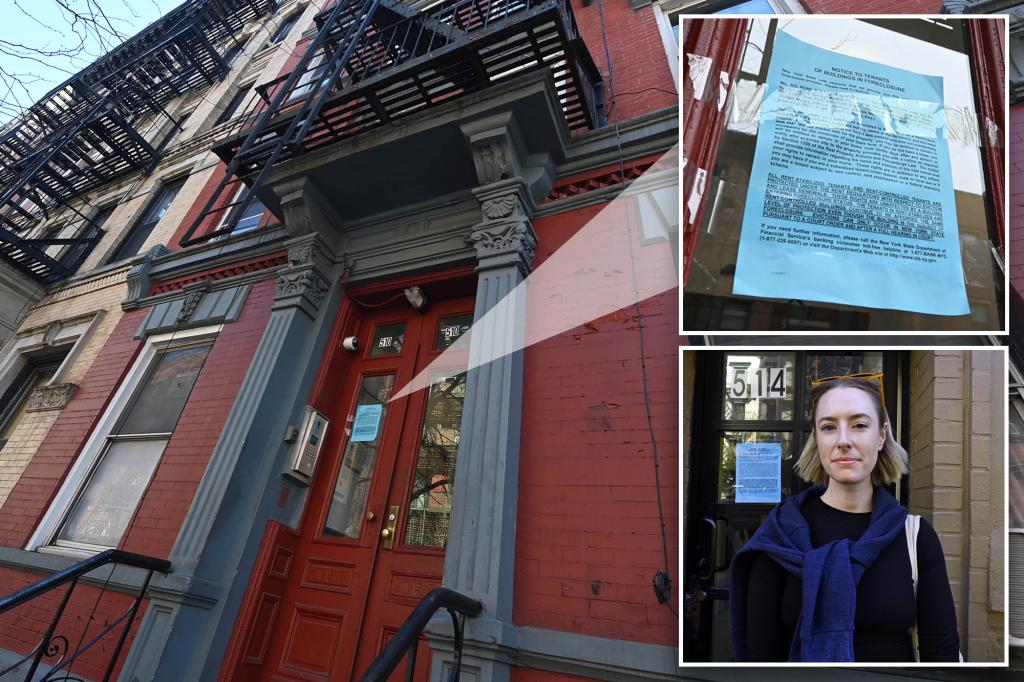Thousands of rent-stabilized apartments in NYC are under threat of foreclosure as an increasing number of landlords stop paying their mortgages — making the coveted units even more scarce, insiders told The Post.
Buildings with a cumulative 176 rent-stabilized units have been foreclosed upon since 2022 – a figure that’s been doubling every year on average — with another 2,093 stabilized units have been put on notice by banks in April that landlords are defaulting on their mortgages, according to an analysis by PropertyShark data.
“It’s a bloodbath,” said Sarah Saltzberg, co-owner of Bohemia Realty Group, who rents pre-war units in upper Manhattan.
Owners lose money on stabilized units, so they leave them empty and skip the listing — or walk away entirely, leading to foreclosures, Saltzberg said.
“The owners are under water — that’s why in the past year it keeps happening over and over,” she said.
Many of the pre-1974 buildings — the year NYC established the rent stabilization system — desperately need repairs, but owners have stopped investing due to 2019 laws capping rent hikes after improvements at 2% and banning landlords from raising rents by up to 20% upon vacancy — changes that cut property values. Rising interest rates over the past three years also slowed renovations to a crawl.
Tenant advocacy groups and Democratic state legislators lobbied hard for these changes, considered the biggest overhaul of New York’s rent laws in a generation — arguing they were necessary to protect tenants against rent hikes and evictions.
And they succeeded.
But NYC tenants could end up paying the price.
“A lot of us might end up displaced — a new owner can come in and kick us all out,” said Coco Portofe, 34, whose East Village rent-stabilized building is the subject of ongoing court proceedings.
If a landlord defaults, a new owner has to keep rent-stabilized units stabilized and keep rent the same.
But the issue is when no one wants to buy the foreclosed property because the rent-stabilized units make it so financially unattractive, insiders told The Post.
In that case, the building’s residents could face eviction.
“There are situations where given the rent-stabilized nature of the tenancy, any purchase price over $1 would be ludicrous,” said foreclosure attorney Alexander Paykin.
Experts point to a recent case in March, when mortgage lender Santander Bank refused to even take the keys of a foreclosed rent-stabilized building in Harlem, as indicative of what could come. Some fear a repeat of the 1970s, when New York landlords simply walked away from decaying buildings that were no longer profitable to rent out.
Portofe’s landlord – private equity firm Madison Capital Realty — is accused by its lender, the Community Preservation Corp., of not making mortgage payments on her building since January 2024, court records show.
“I have to pay rent on time, and they are not upholding their part of the bargain,” said Portofe, who pays $2,200 a month for a rent-stabilized one bedroom on East 12th Street.
Market rate for one bedroom in her nabe rent for an average of $3,800, according to StreetEasy.
A total of 209 rent-stabilized apartments across 15 East Village buildings are part of the lawsuit.
Residential portfolio acquired by Madison acquired those units in 2021 as part of a residential portfolio for $153 million — a small part of the real estate investment firm’s $22 billion assets under management.
Madison Capital is accused of “intentional misconduct” and “gross negligence for “wrongfully” collecting rent and failing to turn over that money to its lender — to whom it’s said to owe more than $76 million in mortgage payments, interest and late fees.
Madison Realty Capital didn’t respond to The Post’s request for comment.
According to data from the Rent Guidelines Board — 10% of the 643,140 pre-1974 rent-stabilized apartments in New York City — an estimated 64,314 units – are losing money, a figured that’s doubled since 2019 and is only expected to grow.
Before the rental laws were overhauled, rent-stabilized buildings were a lot more profitable.
“The extent of this rent shortfall will grow over time, risking the long-term sustainability of these key segments of the city’s affordable housing stock,” said Mark A. Willis, a senior policy fellow at NYU’s Furman Center for Real Estate and Urban Policy.
And about to make matters even worse is a tax-lien sale the city Department of Finance is planning to hold on June 3 — the first since the pandemic — to sell the debt of landlords who’ve been delaying property tax, water or sewer payments to try to stay afloat.
Whoever buys up that debt could foreclose on the properties to collect what’s owed.
Additional reporting by Helayne Seidman
Read the full article here


